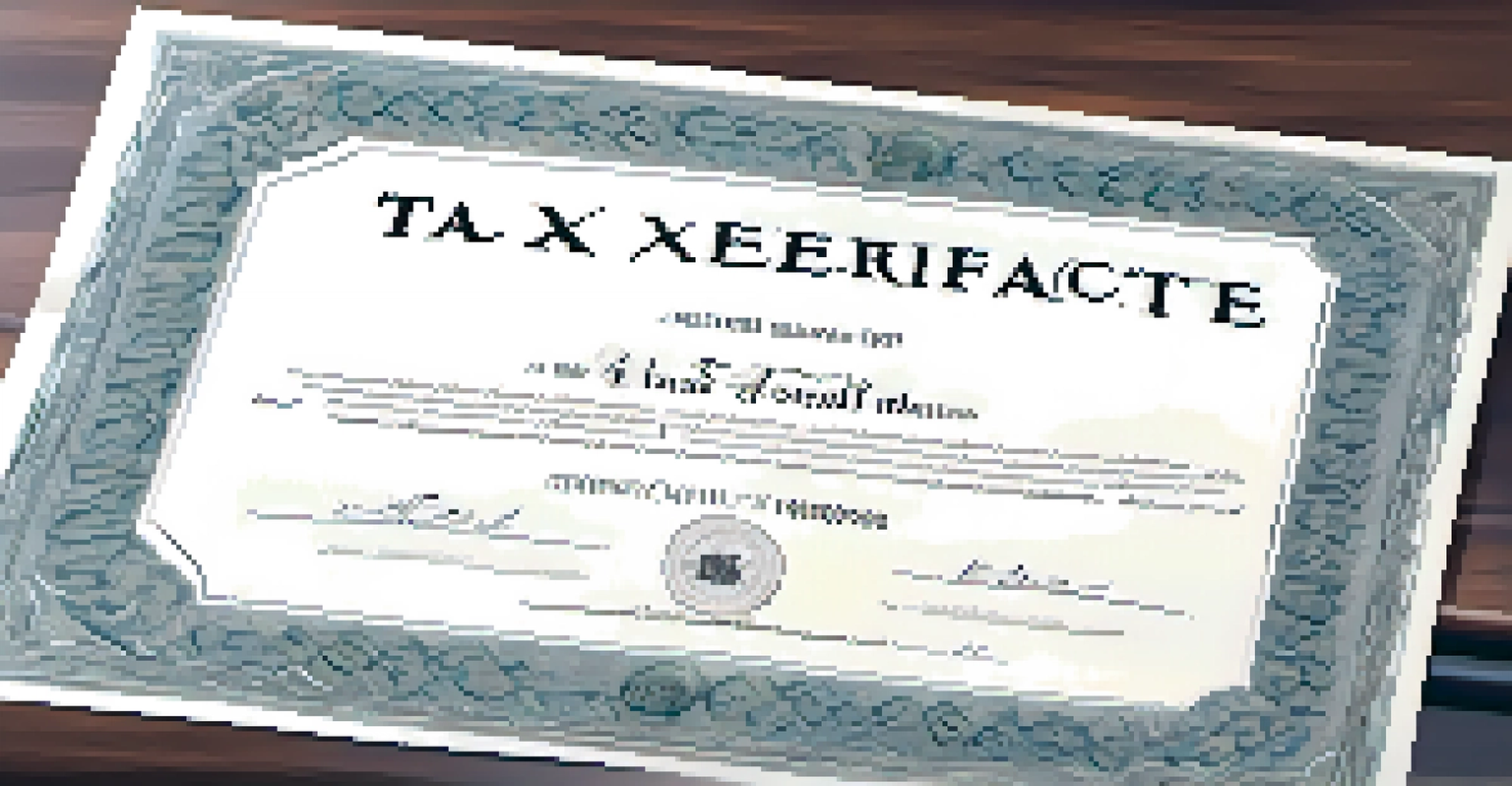Exploring the Role of Tax Liens in Real Estate Investments

What Are Tax Liens and How Do They Work?
Tax liens are legal claims that a government entity places on a property when the owner fails to pay their taxes. They serve as a way for municipalities to recover unpaid taxes and can be a powerful tool for real estate investors. When a tax lien is filed, it gives the government the right to collect the owed amount plus any interest or penalties, making it a serious financial obligation for the property owner.
The best investment on Earth is earth.
For investors, understanding tax liens involves knowing how they can be purchased at auctions or through direct sales from municipalities. Buyers pay the amount owed in taxes, and in return, they acquire the right to collect that debt, often with interest. This creates a unique opportunity for investors to earn a return on their investment, sometimes reaching rates that are significantly higher than traditional investments.
It's important to note, however, that purchasing a tax lien doesn't immediately grant ownership of the property. Instead, it means you hold the debt against the property, and if the owner fails to pay the back taxes, you could eventually foreclose on the property. This potential for property acquisition makes tax liens an attractive option for savvy investors.
Benefits of Investing in Tax Liens
Investing in tax liens comes with several appealing benefits, the most notable being the potential for high returns. Depending on the state and specific circumstances, returns can range from 8% to 36%, which far surpasses typical savings accounts or CDs. This makes tax liens an attractive option for those looking to diversify their investment portfolio.

Another significant advantage is the relatively low barrier to entry. Many tax liens can be purchased for a fraction of the property's value, allowing investors to dip their toes into real estate without needing a large capital investment. This accessibility opens the door for both seasoned investors and beginners looking to enter the market.
Tax Liens: An Investment Opportunity
Tax liens provide investors a chance to earn high returns by purchasing the legal claims on properties with unpaid taxes.
Additionally, tax lien investments can provide a sense of security. Since tax liens are backed by real estate, you have a tangible asset supporting your investment. Even if the property owner doesn’t pay their taxes, you may end up owning the property itself, giving you multiple avenues for potential profit.
Risks Involved with Tax Lien Investments
While tax lien investing can be lucrative, it’s not without its risks. One major concern is the possibility of the property owner redeeming the lien, which would return your investment with interest, but could fall short of your expectations. If the property owner fails to redeem, you may have to navigate the foreclosure process, which can be time-consuming and costly.
In investing, what is comfortable is rarely profitable.
Another risk is the potential for hidden issues with the property itself. Just because you hold a lien doesn’t mean the property is in good condition or free of other encumbrances, such as mortgages or additional liens. Conducting thorough due diligence is essential before investing in a tax lien to avoid unexpected surprises down the road.
Lastly, the tax lien market can be competitive, especially in desirable areas. This competition can drive up prices at auctions, making it harder to find good deals. Therefore, being strategic and informed is crucial to successfully navigating this investment landscape.
How to Get Started with Tax Liens
Getting started with tax lien investing requires a bit of research and preparation. First, familiarize yourself with your state’s tax lien laws, as they can vary significantly from one location to another. Understanding the legal framework will help you know your rights and responsibilities as a lien holder.
Next, consider attending local tax lien auctions or exploring online options. Many municipalities hold regular auctions where you can bid on available tax liens. It’s beneficial to prepare a list of properties you’re interested in and set a budget beforehand to avoid overspending.
Benefits and Risks of Tax Liens
While tax lien investments offer attractive potential returns and lower entry costs, they also come with risks like property condition and competitive markets.
Lastly, networking with other investors or joining real estate investment groups can provide valuable insights and support. Experienced investors can share tips, strategies, and even potential leads on tax lien opportunities, making your journey into this investment avenue much smoother.
Key Considerations Before Investing
Before diving into tax lien investments, it’s important to assess your financial situation and investment goals. Consider how much capital you’re willing to allocate and how long you can afford to have your money tied up. Tax liens can take time to yield returns, so patience is key.
Conducting thorough research on potential properties is equally crucial. Look into the property’s condition, location, and any existing liens or mortgages that could affect your investment. This due diligence will help you make informed decisions and avoid properties that could lead to losses.
Lastly, be aware of the tax lien redemption period, which is the time frame in which the property owner can pay off their debt to reclaim their property. This period varies by state and can impact your investment strategy, as it determines how long you might wait for returns.
Tax Lien vs. Tax Deed: What’s the Difference?
Tax liens and tax deeds are often confused, but they represent different investment opportunities. A tax lien gives you the right to collect the debt owed on a property, while a tax deed allows you to purchase the property outright after the owner fails to pay taxes. Understanding this distinction is key to choosing the right investment strategy for your goals.
Investing in tax deeds typically involves acquiring the property at a lower price than its market value, which can be appealing for those looking to flip or rent properties. However, tax deeds can come with greater risks, as you may inherit any existing liens or issues with the property. Thus, it’s crucial to conduct thorough research on tax deeds as well.
Research is Key Before Investing
Thorough research on state laws, property conditions, and market dynamics is essential for successful tax lien investing.
Ultimately, whether you choose tax liens or tax deeds will depend on your investment strategy and risk tolerance. Both avenues offer unique opportunities for growth, but understanding their differences will help you make an informed decision that aligns with your financial objectives.
Conclusion: Is Tax Lien Investing Right for You?
In conclusion, tax lien investing can be a rewarding venture for those willing to put in the time and effort to understand the market. With the potential for high returns and the opportunity to acquire real estate, it’s a strategy worth considering for diversifying your investment portfolio. However, it’s essential to weigh the risks and conduct thorough research before jumping in.
Consider your financial goals, risk tolerance, and how much time you can dedicate to managing your investments. If you’re excited about the prospect of tax liens but unsure where to start, think about reaching out to experienced investors or joining local real estate groups for guidance.

Ultimately, tax lien investing can be a valuable addition to your investment strategy, provided you approach it with the right mindset and preparation. By understanding the ins and outs of this niche market, you can navigate it successfully and potentially reap significant rewards.